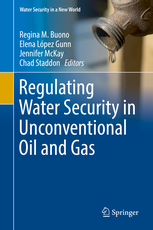 The legal, policy and regulatory issues raised by the use of water for hydraulic fracturing are explored in a new book that offers different perspectives, data and experiences on the challenges that unconventional energy development presents for water security around the world. It examines how these challenges are being addressed by regulators, operators and other stakeholders.
The legal, policy and regulatory issues raised by the use of water for hydraulic fracturing are explored in a new book that offers different perspectives, data and experiences on the challenges that unconventional energy development presents for water security around the world. It examines how these challenges are being addressed by regulators, operators and other stakeholders.
Co-edited by Regina M. Buono, Elena López Gunn, Jennifer McKay and IWSN Director Chad Staddon, Regulating Water Security in Unconventional Oil and Gas takes an interdisciplinary approach. The authors come from a variety of institutions and perspectives – many in academia and policy think tanks, but some from business, the consulting community, non-governmental organisations, and the practice of law. The authors’ disciplinary backgrounds are varied, encompassing everything from agriculture to zoology, and from law and economics and geography.
The book includes chapters looking at water security in energy production in general (i.e., the ‘water-energy nexus’, or how unconventional oil and gas production interacts with the human right to access to water), as well as issue-specific and geographically (or jurisdictionally) distinct case studies written by experts from around the world. One of the strengths of this volume is the inclusion of work by authors local to the countries being discussed and, in particular, those countries where shale oil and gas are most prominent, either because resources are already under exploitation or because existing reserves are in exploration (namely the United States, Australia, Argentina, Canada, and the UK). There are also chapters about countries where shale oil and gas production could soon develop (Poland, Mexico, South Africa and China).
The book, published by Springer, is available here.
